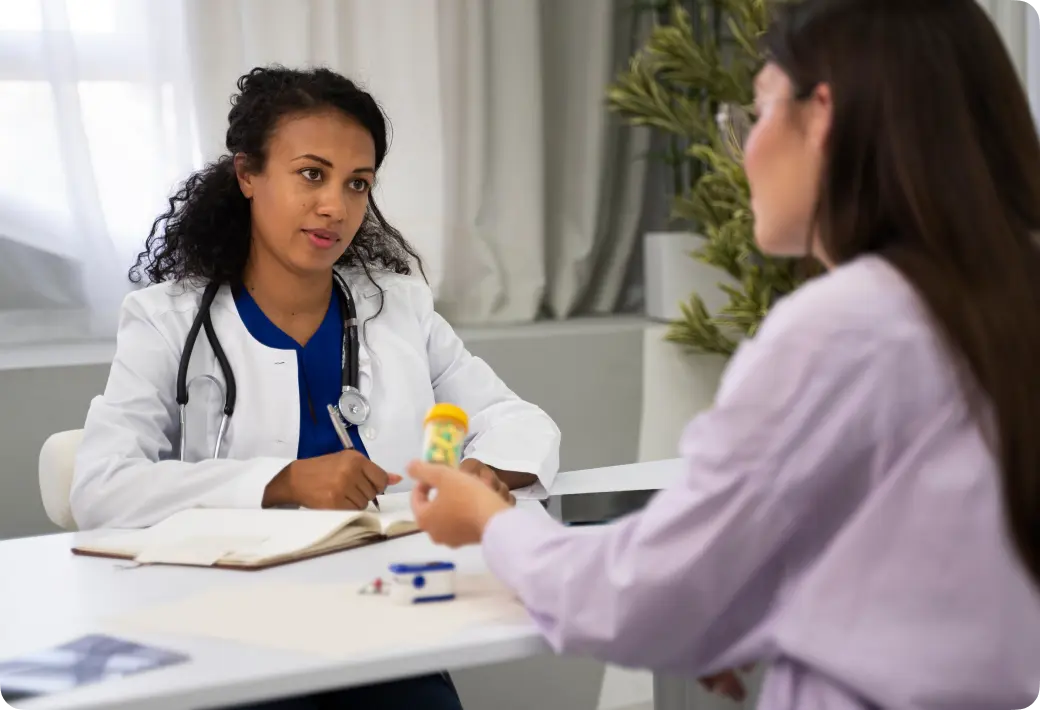- Home
- Speciality
- Gynecology
Gynecological Care
Compassionate gynecological care for every stage of womanhood

Services Offered

Routine Gynecological Exams and Screenings
- Pap smears
- HPV testing
- Pelvic exams

Menstrual Disorders Treatment
- Management of heavy periods (menorrhagia)
- Irregular periods
- Polycystic Ovary Syndrome (PCOS) management

Minimally Invasive Surgery
- Laparoscopic surgery for endometriosis, fibroids, ovarian cysts
- Hysteroscopic procedures for fibroids and polyps
- Colposcopy for abnormal Pap smear results

Treatment for Urogynecology Issues
- Pelvic organs prolapse management
- Incontinence treatment
- Bladder repair surgery

Endometriosis and Fibroid Treatment
- Surgical removal of fibroids
- Endometrial ablation
- Hormonal therapy

Menopause Care
- Hormone replacement therapy (HRT)
- Non-hormonal treatment options
- Bone health management

Cancer Screening and Management
- Cervical cancer screening
- Ovarian, uterine, and breast cancer screening
- Surgical and non-surgical cancer treatments

Sexual Health and Wellness
- Treatment for vaginal dryness
- Sexual dysfunction
- Pelvic pain management

Genital Reconstruction Surgery
- Vaginal rejuvenation
- Repair after childbirth or trauma

Contraception Services
- Birth control counselling
- Intrauterine device (IUD) insertion
- Permanent sterilization (tubal ligation)
Services Offered
- Pap smears
- HPV testing
- Pelvic exams
- Management of heavy periods (menorrhagia)
- Irregular periods
- Polycystic Ovary Syndrome (PCOS) management
- Laparoscopic surgery for endometriosis, fibroids, ovarian cysts
- Hysteroscopic procedures for fibroids and polyps
- Colposcopy for abnormal Pap smear results
- Pelvic organs prolapse management
- Incontinence treatment
- Bladder repair surgery
- Surgical removal of fibroids
- Endometrial ablation
- Hormonal therapy
- Hormone replacement therapy (HRT)
- Non-hormonal treatment options
- Bone health management
- Cervical cancer screening
- Ovarian, uterine, and breast cancer screening
- Surgical and non-surgical cancer treatments
- Treatment for vaginal dryness
- Sexual dysfunction
- Pelvic pain management
- Vaginal rejuvenation
- Repair after childbirth or trauma
- Birth control counselling
- Intrauterine device (IUD) insertion
- Permanent sterilization (tubal ligation)
Advanced Care and Procedures
Hormonal disturbances, e.g. PCOS
Laparoscopic-assisted vaginal hysterectomy
Urodynamics
Advanced Care and Procedures
Hormonal disturbances, e.g. PCOS
Laparoscopy is performed to view and access the exterior of the uterus, ovaries, fallopian tubes and other structures within the pelvis.
Laparoscopic-assisted vaginal hysterectomy
A laparoscopic assisted vaginal hysterectomy (LAVH) is a surgical procedure that removes the uterus, cervix, fallopian tubes, and/or ovaries through small incisions in the abdomen and vagina
Urodynamics
Urodynamic testing, is a series of tests that evaluate how well the bladder, urethra, and sphincters store and release urine.


Meet Our team of Specialists
Meet Our team of Paediatrician






Downloadable Resources

Prepartum Care: Addressing Physical and Emotional Changes

Options include natural childbirth, epidural, C-section, and breastfeeding guides.

The Importance of Regular Gynecological Checkups

Resources
A Woman’s Guide to Routine Gynecological Care

Prepartum Care: Addressing Physical and Emotional Changes

Options include natural childbirth, epidural, C-section, and breastfeeding guides.

The Importance of Regular Gynecological Checkups

Ask Our Experts: FAQs
The frequency of gynecological checkups depends on your age, health history, and any specific concerns you may have. Generally, it’s recommended to schedule annual checkups starting from your early 20s. However, if you’re sexually active, have symptoms like abnormal bleeding, pain, or discomfort, or have any other concerns, you may need to see a doctor more frequently.
Here are some tips to improve your urinary tract health:
- Stay hydrated: Drinking plenty of water helps to flush out bacteria.
- Wipe correctly: After using the bathroom, wipe from front to back to prevent bacteria from entering your urethra.
- Avoid irritants: Certain products, such as scented soaps, bubble baths, and feminine sprays, can irritate the urinary tract.
- Empty your bladder completely: Holding in urine for long periods of time can increase the risk of infection.
- Urinate after sex: This helps to flush out bacteria that may have entered the urethra during sex.
Endometriosis is a condition in which tissue similar to the lining of the uterus grows outside of the uterus. It can cause a variety of symptoms, including pelvic pain, heavy bleeding, and infertility. Treatment for endometriosis varies depending on the severity of the symptoms and the patient’s individual needs. Some common treatment options include:
- Pain medication: Over-the-counter or prescription pain relievers can help to manage pain.
- Hormone therapy: Birth control pills, patches, or injections can help to regulate hormone levels and reduce symptoms.
- Surgery: In severe cases, surgery may be necessary to remove endometrial tissue.
Some of the more common sources of acute pelvic pain, or pain that happens very suddenly, may include: Ectopic pregnancy (a pregnancy that happens outside the uterus) Pelvic inflammatory disease (also called PID, an infection of the reproductive organs) Twisted or ruptured ovarian cyst.

